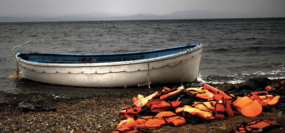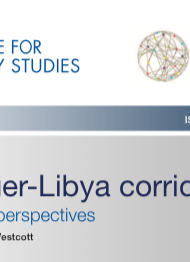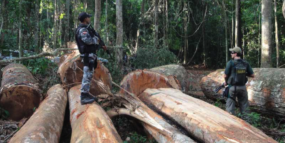Posted on 10 Oct 2015
The extraordinary opportunity to permeate ‘fortress Europe’ thanks to the chaos in Libya is proving a strong siren song for West Africans. Their route to the North African coast requires traversing the treacherous Sahara – which is impossible without a smuggler. An estimated 3,000 people are travelling through Agadez in Niger each week, with each one paying an average of US $800. The nomadic groups that have long trafficked and smuggled people along the trans-Saharan trails are using these windfall profits to consolidate their control over routes. The result is a rise in state corruption and violence, driven by competition as well as new inflows of cash for the region’s various armed groups. The implications are serious for efforts at stability and state consolidation in the Sahel and Maghreb.
In meetings with national and international interlocutors in Mali and Niger in September of this year, the outlook had never been so pessimistic. The already manifold challenges of insurgency, conflict, corruption and terrorism have been amplified by a sudden and vast cash injection – akin to the levels generated by the cocaine trade in West Africa when it first started in the 1990s. As recently as 2013, traditional trans-Saharan migrant smuggling networks were estimated by UNODC to be worth between USD 8–20 million a year, which is insufficiently lucrative to generate the transnational criminal networks that warrant international concern. The smuggling of migrants along these same networks is now estimated to be worth upwards of USD 323 million a year in Libya alone, and with funding being channelled to militia and terrorist groups such as Mali’s separatists and IS, this burgeoning illicit trade is deeply impacting on stability in the region.
This radical transformation was triggered by the mass-displacement resulting from Syria’s five years of civil war. Observing this trend in its infancy, the 2014 Global Initiative against Transnational Organized Crime report, Smuggled Futures: The dangerous path of a migrant from Africa to Europe, noted that for, nomadic tribes like the Tuareg or the Tebu, migrants were yet one more form of cross-border illicit trade to be facilitated or taxed. The Tebu, in particular, with their dispersed clansmen reaching across Chad to the East and Horn of Africa, were particularly integrated in the trade, thanks to the consistent flow of refugees and asylum seekers from repressive regimes in Eritrea and Somalia. Enriched by migrant smuggling, the Tebu have expanded their zone of influence into areas typically controlled by the Tuareg, over whom they have gained a marked ascendency. While the Tuareg are still trafficking to Agadez – one notable Tuareg family has reportedly bought a bus line to give them greater control over migrant flows within the Economic Community of West African States (ECOWAS) freedom of movement zone – the routes into Libya are now dominated by the Tebu.
During the Libyan revolution and its aftermath, the migrant trade became increasingly commoditized. In Libya’s major cities, migrants held in detention centres managed by revolutionary brigades are contracted out as informal work gangs, receiving no compensation, but generating revenue for those who control them. Rounding-up and imprisoning illegal migrants and extorting their families for money to buy their release has become a ready source of income for some of the many militia groups active in Tripoli and Benghazi, boosting their financial clout and ability to procure weapons. This new source of income is also sustaining their otherwise intransient positions, reducing their incentive to come to the negotiating table. The European search and rescue mission in the Mediterranean has reduced the barriers to entry into the smuggling market, which has created a chaotic, unfettered ‘raft economy’ to which anyone with a boat can gain access. Local residents in Libya will fight to protect this source of income as their legitimate livelihoods have been worn away by the protracted instability.
The level of disorganization and the risk of suffering violent abuse or extortion along the routes through the Sahel and Libya have reduced its appeal for the more discerning Syrian traveller. Since the spring of 2015, the Syrians have shunned the Libya Mediterranean crossing in favour of a transit from Turkey, across the Aegean to Greece, and then along the Western Balkan route to Germany or Sweden. Yet the number of West Africans traveling this route has not appreciably declined, as the newly consolidated and organized groups use false rumour and heavy-handed coercive tactics to recruit new migrants from across West Africa, which is estimated as containing the largest migrant stock population in the world. With greater opportunity to succeed, and at a lower cost than ever offered before, few West Africans appear to be deterred by the risks of going to sea.
To combat human smuggling, Europe will need to find some incentives to induce cooperation from states in the region, who are disinclined to add another Western security concern to their already extensive list of challenges. Currently illicit migration receives little genuine resistance as it has always been ubiquitous across Sub-Saharan Africa, and the ability to migrate is considered a resilience strategy and positive economic opportunity for those able to afford the journey. The remittances that migrants send home are a potent and positive contribution to the region’s economy and development. The use of ‘facilitators’ is not stigmatized as a criminal activity and the revenue made from the smuggling trade makes a significant contribution to the local economies of marginalized border towns along route. States would be hard pressed to provide legitimate alternatives to this source of income.
Counter intuitively, the answer may lie in emphasizing the development roots of the crisis and the causal links to the changing nature of the terror threat in the Sahel. Over the past year, terrorism in Mali has distinctly changed its personality; groups have fragmented and are striking further south and at national targets, rather than being localized within the Northern question. Niger, meanwhile, is seeing a sharp trend in radicalization, the roots of which are largely attributed to the state failing to remain relevant to the majority of the population. Attacks on the Catholic population show a propensity for violence that the secular state of Niger has long been free of. These are the warblings of the proverbial canary down the coal mine, which speak to the need for development-led interventions to address the root causes of the region’s vulnerabilities, rather than a heavy-handed crackdown that would damage livelihoods, deprive the well-intentioned of perceived opportunities, and further estrange those engaged in and benefiting from human smuggling.
This blog was written by Tuesday Reitano, Head of the Secretariat, for The Broker’s SahelWatch blog, and originally published on 16 October 2015.
Photo credit main picture: European Commission DG Echo, Transit Camp Benghazi / Via Flickr



